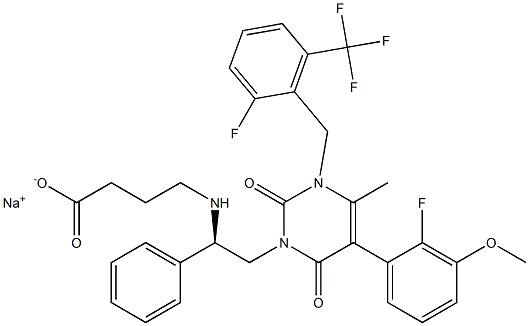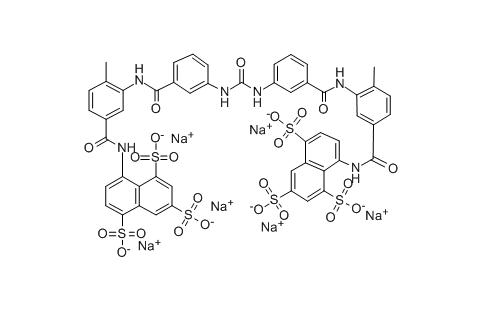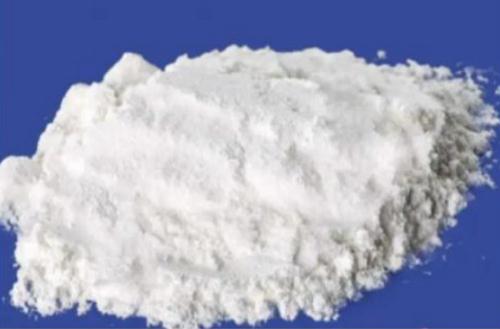Side effects and uses of Elagolix Sodium
Elagolix Sodium has been used in trials studying the basic science and treatment of Endometriosis, Folliculogenesis, Uterine Fibroids, Heavy Uterine Bleeding, and Heavy Menstrual Bleeding. As of 24 July 2018, however, the U.S. Food and Drug Administration (FDA) approved AbbVie's elagolix under the brand name Orilissa as the first and only oral gonadotropin-releasing hormone (GnRH) antagonist specifically developed for women with moderate to severe endometriosis pain.
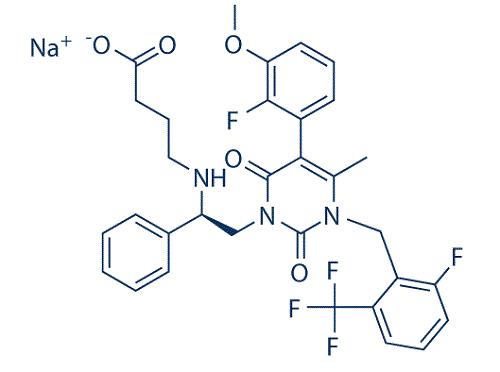
Uses
Elagolix Sodium is an oral gonadotropin-releasing hormone antagonist being studied for the treatment of endometriosis and uterine fibroids. The U.S. Food and Drug Administration (FDA) approved AbbVie's elagolix under the brand name Orilissa as the first and only oral gonadotropin-releasing hormone (GnRH) antagonist specifically developed for women with moderate to severe endometriosis pain.
Pharmacodynamics
Elagolix Sodium acts as a potent and selective competitive antagonist of the gonadotropin-releasing hormone receptor (GnRHR), the biological target of the hypothalamic peptide hormone gonadotropin-releasing hormone (GnRH).As such, it is a GnRH antagonist.The affinity (KD) of elagolix for the GnRHR is 54 pM.By blocking the GnRHR in the pituitary gland, elagolix suppresses the GnRH-induced secretion of the gonadotropins luteinizing hormone (LH) and follicle-stimulating hormone (FSH) from the anterior pituitary, and thereby decreases the production of sex hormones by the gonads.
In women, elagolix Sodium dose-dependently suppresses the production of ovarian hormones including estradiol, progesterone, and testosterone, and thereby decreases the circulating levels of these hormones.In men, GnRH modulators suppress the testicular production of testosterone and estradiol, decreasing the circulating levels of these hormones similarly.Unlike previous GnRH agonists and antagonists, referred to collectively as GnRH analogues, elagolix is a non-peptide and small-molecule compound that can be taken orally.
Estrogens like estradiol stimulate the growth of the endometrium, and thereby aggravate symptoms of endometriosis.By suppressing estrogen production and levels, elagolix Sodium decreases the growth of the endometrium and decreases endometriosis symptoms such as pelvic pain.
Elagolix Sodium is a short-acting GnRH antagonist, with a terminal half-life of typically about 4 to 6 hours.Because of the short duration of elagolix in the body, the activation of the GnRHR by GnRH is not fully blocked throughout the day with once-daily administration of elagolix.As a result, gonadotropin and sex hormone levels are only partially suppressed when elagolix is taken once per day.
In addition, the degree of suppression can be dose-dependently adjusted as needed, for instance with higher-dose twice-daily administration to achieve greater hormonal suppression.Because of its short duration in the body, the effects of elagolix are rapidly reversible upon discontinuation.In addition, due to its partial and incomplete suppression of estradiol levels, the side effects of elagolix, such as hot flashes and decreased BMD, are lower than with first-generation GnRH modulators.
Side effects
The side effects of elagolix Sodium are in general similar to menopausal symptoms.The most common side effects of elagolix (incidence ≥10%) are hot flashes, night sweats, headaches, nausea, and amenorrhea (cessation of menstruation).The next most frequent side effects of elagolix (incidence ≥5%) are insomnia, anxiety, arthralgia (joint pain), depression, and mood changes.Less common side effects of elagolix (incidence ≥3% and <5%) include decreased sex drive, diarrhea, abdominal pain, weight gain, dizziness, constipation, and irritability.
Other common side effects of elagolix Sodium include decreased bone mineral density (BMD) and changes in the blood lipid profile.Rare but serious adverse effects that were observed during elagolix therapy in clinical trials included appendicitis (0.3%), abdominal pain (0.2%), and back pain (0.2%), though it is unknown if these were due to elagolix.Other serious adverse effects of elagolix may include bone loss, miscarriage, suicidality, and elevated liver enzymes.Elagolix was discontinued due to side effects by 5 to 10% of women in clinical trials, with the most common reasons being hot flashes or night sweats, nausea, and decreased BMD.
You may like
Related articles And Qustion
Lastest Price from Elagolix Sodium manufacturers

US $5.00-0.50/KG2025-06-05
- CAS:
- 832720-36-2
- Min. Order:
- 1KG
- Purity:
- 99% hplc
- Supply Ability:
- 500TONS
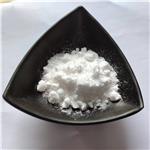
US $10.00/KG2025-04-21
- CAS:
- 832720-36-2
- Min. Order:
- 1KG
- Purity:
- 99%
- Supply Ability:
- 10 mt
